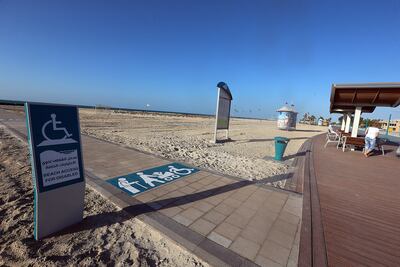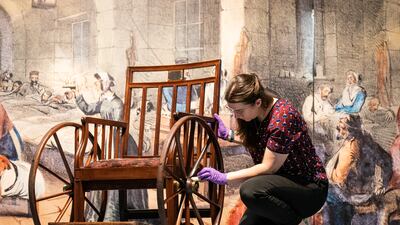It is a fundamental principle in the UAE to ensure that every person in this rapidly growing country should be able to fully engage in society. At the heart of this principle lies accessibility. Public spaces should be designed to be open, inclusive and inviting to everyone, whether those are outdoor gardens, indoor shopping malls or cultural institutions.
Universal design, according to the late product designer Ronald Mace, emphasises the creation of products, processes and complete environmental interventions that can be used by all. This approach is especially crucial for the full inclusion of persons with disabilities, who make up roughly 15 per cent of the world's population.
The term “accessibility” should not be limited to physical access to buildings but should encompass broader accommodations that allow for the inclusion of persons with sensory disabilities (vision and hearing) as well as persons with intellectual disability.

Examples of such accommodations include access to a diversity of formats when offering information (such as Braille, audio options, or large text print), digital inclusion by implementing digital accessibility standards and features in all platforms, and an all-encompassing approach to how we communicate and interact with persons with disabilities.
During my tenure leading the museums authority in Sharjah, I made it a fundamental pillar of work to ensure that people with disabilities or “persons of determination”, as adopted by the UAE, felt included in spaces and were able to engage with our collections and in our cultural activities and events.
This particular outlook was imprinted on me when I wrote an essay about the topic for my museum design course in graduate school in 2002. At the time the concept was new, with its principles having been developed only a few years prior, in 1997.
The concept of inclusive spaces that dismantle literal and symbolic barriers was revolutionary for its de-stigmatising of differences in ability. It utilised a set of principles that championed the promotion of diversity, understanding and social cohesion.
This notion continued to resonate with me when a debilitating lower back injury over a decade ago temporarily “disabled” me physically for over a year. It is a concept that I ensured my team kept in mind when working with the community of persons with disabilities.
Our abilities, whether physical, sensory, behavioural, or otherwise, are unique. They are not fixed and can change temporarily or permanently throughout our life times.
In the UAE cultural institutions, such as Sharjah museums, are leading the way in inclusive practices. They have trained staff that can offer tours in Arabic sign language, tactile exhibits, larger text material and Braille offerings in both English and Arabic, audio guides and accessible space considerations for wheelchairs, among other features. But to truly embody a commitment to enhancing accessibility, Sharjah museums designed a comprehensive free annual programme for people with disabilities, offered weekly in both Arabic and English.
Target groups include persons with behavioural and cognitive disabilities. We strengthened this investment in online platforms and digital content to reach broader audiences. I remember instituting our long term “Autism Friendly Museums” initiative in 2018 across Sharjah museums when a conversation with an old friend revealed the extent of her struggles with her two young children who were diagnosed with autism.
As successful as the initiative was, we were the first-of-its-kind, dedicated scheme in a public space, in the GCC with specifically designed activities to create learning experiences that met the needs of children with autism. This indicated that there was still more we needed to do to meet the needs of people with different disabilities and embed it in our everyday lives and mindset as a society.
In the Middle East, particularly the UAE, significant strides have been made in recognising the rights of individuals with disabilities and promoting universal accessibility. Sharjah paved the way with the establishment of Sharjah City for Humanitarian Services (SCHS) in 1979, later decreed in 1995 as an independent organisation in the Emirate of Sharjah aiming to serve people with disabilities in the UAE.
Years later, legal frameworks, including Federal Law No 29 of 2006, which opposes disability-based discrimination and advocates for equal opportunities and accessibility, came into effect. Moreover, initiatives such as the UAE Vision 2021 and the Abu Dhabi Plan for People of Determination 2020-2024, focus on inclusive societies, providing equal opportunities and accessibility, aligning with global sustainable development principles including education, employment and accessibility to public spaces.
I believe we can all improve the environment we live in. This begins with raising awareness and building empathy and understanding towards persons with disabilities, their families, and their communities to promote an inclusive mindset. It is a crucial aspect to providing equal opportunities and enhancing overall well-being in the community.
Such an approach must be underpinned by government bodies, educational institutions, disability organisations and advocacy groups. Furthermore, with the UAE as a forerunner in the field of technology and smart services, reviewing current infrastructure and embracing universally designed and inclusive technological advancements can significantly enhance accessibility, making all spaces user friendly.
Even as the country has already taken substantial steps towards promoting accessibility and inclusion, there is room for growth. And my hope is that all of us, with our own areas of agency, can commit to ensuring that people with disabilities have access to a more inclusive and equitable world.


